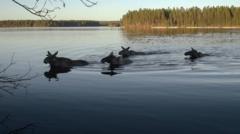Every spring, a remarkable event unfolds in northern Sweden that has captivated millions: "The Great Moose Migration." This annual phenomenon has been brought to life through a 24-hour livestream provided by SVT Play, Sweden's national broadcaster. This year, excitement began a week ahead of schedule due to unseasonably warm weather.
For the past six years, viewers have linked into this soothing broadcast, which captures moose swimming across the Angerman River as they embark on their journey toward lush summer pastures. Cait Borjesson, a devoted follower of the stream since she discovered it during the COVID-19 pandemic, articulated the calming experience: “It feels incredibly therapeutic,” she expressed, as she dedicated a remarkable 16 hours to watch the livestream this Tuesday.
The series has garnered a substantial following, exemplified by a dedicated Facebook group of over 77,000 members who share their experiences, insights, and moments of emotional connection with the annual migration. This stream fosters community as viewers bond over their shared love for nature and the majestic moose.
Highlighting the ecological significance of this journey, Goran Ericsson, a dean at the Swedish University of Agricultural Sciences, noted that the moose have been migrating since the Ice Age, adapting to seasonal changes. "Almost 95% of the moose in this region migrate annually,” he explained, attributing this year’s early migration to milder winter conditions and reduced snow cover.
Equipped with more than 30 cameras, SVT captures the awe-inspiring vistas and sounds of nature as moose traverse the landscape. Initially attracting nearly a million viewers at its debut in 2019, the show has seen remarkable growth, drawing in a staggering nine million viewers this past spring.
Minh-Xuan Truong, a researcher from the same university, noted that the appeal of the "slow TV" genre reflects a growing desire among viewers to experience unhurried nature in contrast to the rapid pace of modern media. Many viewers expressed that they preferred the natural sounds of wind, birds, and rustling trees rather than background music, enriching their linkage to the environment.
Sweden is home to approximately 300,000 moose, celebrated as the "King of the Forest," and this annual migration continues to be a poignant reminder of the beautiful interplay between nature and human experience.




















